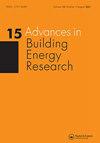基于线性矩阵不等式的建筑参数不确定暖通空调系统的鲁棒模型预测控制
IF 2.5
Q2 CONSTRUCTION & BUILDING TECHNOLOGY
引用次数: 14
摘要
本文提出了一种新的鲁棒控制器,用于在参数不确定的情况下建立气候控制。控制器的设计基于模型预测控制(MPC)框架,并包含时变约束。通过在控制律综合中明确考虑参数的不确定性,实现了鲁棒设计。建筑参数的变化以多面体不确定性的形式表示。通过最小化适当的“最坏情况”成本函数来获得鲁棒控制作用,从而导致最小-最大优化问题的定义。该优化问题是利用线性矩阵不等式(lmi),允许有效的数值计算控制命令。仿真结果表明,即使存在较大的模型不确定性,该方法也能将建筑物的室内温度保持在期望的范围内。并与不考虑参数不确定性的标称控制器进行了比较。数值计算结果表明,在相同条件下,与标称控制器相比,鲁棒性设计提高了24%。仿真结果还表明,该鲁棒控制系统在严重不确定性条件下的控制性能提高了17%。本文章由计算机程序翻译,如有差异,请以英文原文为准。
Robust model predictive control of HVAC systems with uncertainty in building parameters using linear matrix inequalities
ABSTRACT In this work, a new robust controller is proposed for building climate control in presence of parametric uncertainties. The design of the controller is based on the Model Predictive Control (MPC) framework and it includes time-varying constraints. The robust design is implemented by explicitly considering parametric uncertainty in the synthesis of the control law. Variations of the parameters of the buildings are represented in the form of polytopic uncertainty. The robust control action is obtained by minimizing an appropriate ‘worst-case’ cost function, which leads to the definition of a min–max optimization problem. This optimization problem is formulated using Linear Matrix Inequalities (LMIs) that allow for efficient numerical computation of the control command. Simulation results show that the proposed approach is successful in keeping the indoor temperature of the building in the desired range even in presence of large model uncertainties. The proposed controller is also compared with a nominal controller synthesized without accounting for parametric uncertainty. Numerical results confirm 24% better performance of the robust design in comparison with the nominal controller with same conditions. Further, simulation results also demonstrate that the robust control system achieves 17% better performance in the case of severe conditions of uncertainty.
求助全文
通过发布文献求助,成功后即可免费获取论文全文。
去求助
来源期刊

Advances in Building Energy Research
CONSTRUCTION & BUILDING TECHNOLOGY-
CiteScore
4.80
自引率
5.00%
发文量
11
 求助内容:
求助内容: 应助结果提醒方式:
应助结果提醒方式:


